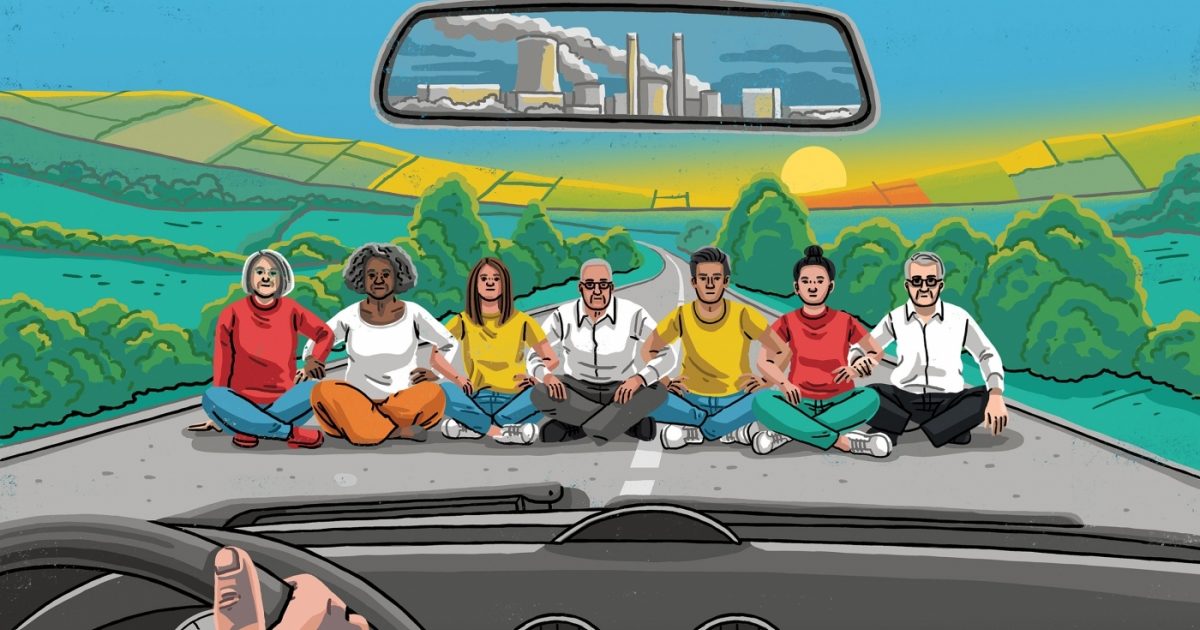Retired vicar Revd Mark Coleman was jailed for five weeks for sitting in a road as part of Insulate Britain’s protests. Now released from prison, he writes about his experience and the intergenerational solidarity of his fellow climate activists.
This is an article from the sixth issue of the New Economics Zine. You can find the full issue here.
The view out of my cell window was grim. Mostly high walls and razor wire. But I felt good, at peace.
As I remembered the trial, I was grateful for the people around me. I thought of my co-defendants, both young and old, and of their courage in resisting the government’s murderous plans for fossil fuel expansion. I looked back to October 2019, when I got arrested for sitting on a London road with Extinction Rebellion. Energised by this new group of people, I had helped set up a local group in Rochdale. We made ourselves newsworthy but numbers were small. By 2021 I was getting despondent: the government was not acting and public interest was waning. When I heard about Insulate Britain, I was excited. The prospect of sitting on motorways was terrifying, but the tactics felt right for this critical moment. On October 25, after several arrests on the M25, I sat down in Bishopsgate in the city of London with around 30 others. Whereas my previous actions had led to charges for wilful obstruction of the highway, this one led to the more serious charge of public nuisance.
We were tried in groups of four and ranged in age from 28 to 73. We looked after each other. It was tough because of the judge’s ruling that we could not speak in front of the jury about why we had chosen to break the law. To disobey the judge risked the serious offence of contempt of court with an immediate prison sentence. We struggled to defend ourselves. Imagine my joy speaking freely at my sentencing a few weeks later. Listening to the speeches of my co-defendants had been very moving. This group, a microcosm of the larger intergenerational community, was important to me.
Something terrible and urgent, above and beyond usual issues and politics, has brought us together. It was two years ago, back in 2021, that the former UK government chief scientific adviser, Professor Sir David King, said, “What we do in the next three to four years will determine the future of humanity.” Yet, in full knowledge of the science, and against advice, the UK government is enabling new oil and gas projects. These will kill billions of people. Generational differences are of little concern when faced with such evil.
“When faced with this awareness we can sink into despair or denial. It’s much healthier to choose to resist.”
Getting reflective is perhaps a feature of older age. A friend of 52 said how sobering it was that 70% of species had become extinct in the last 50 years, her lifetime. Another said, “We have knowingly caused the doubling of CO2. No generation in history has caused greater damage … Worse still our generation has a vice-like grip on power…” When faced with this awareness we can sink into despair or denial. It’s much healthier to choose to resist.
Before I started civil resistance I saw a placard with “You will die of old age, we will die of climate change” outside parliament. A few weeks later, a young woman told me that she had decided not to have children because of the climate crisis. It was heartbreaking. But action counters despair — like the GP from Cheshire who told me that she and her husband were protesting on the streets because of their son, who had got them to read up on climate science.
In a situation so unthinkable and frightening it is not good to be alone. A retired grandmother told me, “I’ve never felt more accepted [in Just Stop Oil]. Days spent leafleting with a 40 something were so uplifting.” Caring for each other helps us reach our potential. There are many ways people can help, from recruitment to media to admin. In our individualistic society many of us get distracted by what George Monbiot has wonderfully called “micro consumerist bollocks.” In our communities of resistance we can come together, in all our diversity, focused on nonviolent action.
Later years bring opportunity. A friend from Christian Climate Action told me that now that she reached a point when the kids had left home and the menopause was out of the way, she could embark on a new phase of life. For me, a diagnosis of Parkinson’s nudged me from carrying placards and into civil resistance, moving beyond what I was comfortable with, to doing what was needed.
In the face of the terrible reality of what this government is doing, it is good to stand with younger people in nonviolent resistance. Older people like me are waking up, hearing the call to act, inspired by the young. It feels good to be stepping up into this. My friend Ruth has it right: “We’ve broken their world. Now we know that the least we can do is get off our sofas, open our tool box, and see what we can do to fix it.”
Revd Mark Coleman is a retired vicar and lives in Rochdale.
Image: Eva Bee


